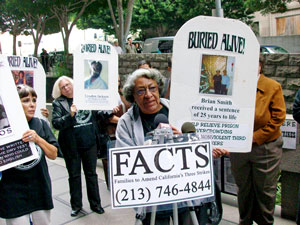Profits fuel prison growth (FCN, 03-05-2002)
LOS ANGELES (FinalCall.com) – Families to Amend California’s Three Strikes (F.A.C.T.S.) law launched its grassroots, volunteer campaign to qualify a Three Strikes reform measure for the November ballot by having a press conference in front of the Criminal Courts Building.

About 50 participants, including F.A.C.T.S. members, former Assemblywoman Jackie Goldberg, the Office of Restorative Justice of the L.A. Catholic Archdiocese, the Youth Justice Coalition and families impacted by three strike laws, which levy a life sentence for offenders convicted of three felony crimes.
The Three Strikes Reform Act of 2008 would provide for an automatic 25-years to-life sentence for anyone convicted of a serious or violent third offense and those serving time for a second strike offense would not be eligible for re-sentencing. The difference between the 2008 measure and Proposition 66, which voters rejected in 2004, is that the current effort would not allow, or would limit, re-sentencing for those with serious prior convictions, like murder or child molestation. Prop. 66 lost its long-held lead in the polls after Gov. Arnold Schwarzenegger released a last-minute TV ad, saying the measure would free murderers, rapists and other violent criminals.
The F.A.C.T.S. proposal would also prohibit re-sentencing for offenses that include drug trafficking of 2.2 lbs or more, the manufacture, compounding, producing, conversion of 1 lb. or more of controlled substances; felony sex offenses requiring registration; crimes committed whole armed with a firearm or deadly weapon, use of a firearm or deadly weapon, or acts intended to cause great bodily harm or injury.
Voters passed “The Three Strikes and You’re Out” Initiative (Prop. 184) in 1994 after the violent
murders of 18-year-old Kimberly Reynolds in 1992 and 12-year-old Polly Klaas in 1993. It pushed for increased sentences for repeat offenders, but was supposed to be applied only to serious, violent offenders. But it did not and many people witnessed family members going to prison for 25 years-to life on minor third criminal conviction, such as petty theft for stealing a pizza or a spare tire.
Dorothy Erskine’s nephew Brian Smith has been in prison since 1994, serving a life sentence for aiding and abetting shoplifting. His two prior felonies were both non-violent crimes. “He has been buried alive and even as we cry out for justice in California, sometimes it’s hard to fathom that we live in a democratic society and we allow this to happen. This is real, but we have an opportunity to change this. Vote this November to let the time fit the crime. Let’s have justice for these men and women,” Ms. Erskine said Jan. 9.
“If the measure reaches the ballot and is passed by voters, it would be implemented almost immediately, but that doesn’t mean that the gates will open up and people will just flow on out. Those incarcerated for non-serious/nonviolent third strikes will have to seek a re-sentencing hearing with the District Attorney,” said Dennis Duncan, president the L.A. chapter of F.A.C.T.S., to The Final Call.
According to Mr. Duncan, the campaign needs a minimum of 430,000 signatures to make the November ballot. Volunteers are working to get twice that amount to sidestep potential errors.
Last year a F.A.C.T.S. study of California voters conducted by the Goodwin Simon Victoria Research team to assess support for a possible ballot proposition. The researches completed 400 telephone interviews over four days and found that 70 percent of the interviewees supported the reforms.
(For more information on the Three Strikes Reform Act of 2008 visit www.facts1.com.)












